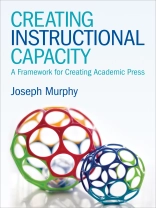Great leaders create stronger foundations by building Instructional Capacity
Technology and the age of information have forced educators to rethink how they can create a supportive culture and build academic press. School leaders who learn how to balance these ideas will build successful teams to meet today’s standards.
In this companion to Creating Productive Cultures in Schools, Joe Murphy unpacks essential elements of building instructional capacity-Academic Press- through effective management of instruction, curriculum, and assessment. Leaders and change facilitators who read this will:
- Be reminded how effective instruction works and what forces shape it
- Understand how powerful assessment ideas can guide successful change
- Discover secrets to hiring and developing capacity-rich talent
- Know how to approach and manage curriculum for 21st century outcomes
‘Over the past decade increasing emphasis has been given by scholars, policymakers and practitioners to the role leaders play in building the capacity of schools to improve teaching and learning. This volume provides a sound foundation for thinking about the meaning of ′capacity′ as well as the tools leaders can use for productive impact.’
Dr. Philip Hallinger
Professor of Educational Management, Chulalongkorn University (Thailand)
‘This book is a practical synthesis of what we know about fostering instructional improvement that should be a required read for every principal. Murphy goes to the heart of leadership by focusing on what can be done in any school or community to strengthen teachers’ capacity to serve all students. There are no simple checklists, but a wise distillation of core ideas that will work in complex settings.’
Karen Seashore Louis, Regents Professor
University of Minnesota
Tabela de Conteúdo
Preface
I. Understanding School Improvement
1. Shaping Forces
2. School Improvement: The Backstage Story
II. Leadership for School Improvement
3. Vision
4. School Culture and Academic Press
III. Building Instructional Capacity
5. Staffing, Time and Material Resources, and Support
6. Talent Development
IV. Leading the Curricular Program
7. School as Academic Place
8. Curriculum and Assessment
Sobre o autor
Joseph F. Murphy is the Frank W. Mayborn Chair and associate dean at Peabody College of Education at Vanderbilt University. He has also been a faculty member at the University of Illinois and The Ohio State University, where he was the William Ray Flesher Professor of Education.In the public schools, he has served as an administrator at the school, district, and state levels, including an appointment as the executive assistant to the chief deputy superintendent of public instruction in California. His most recent appointment was as the founding president of the Ohio Principals Leadership Academy. At the university level, he has served as department chair and associate dean.He is past vice president of the American Educational Research Association and was the founding chair of the Interstate School Leaders Licensure Consortium (ISLLC). He is co-editor of the AERA Handbook on Educational Administration (1999) and editor of the National Society for the Study of Education (NSSE) yearbook, The Educational Leadership Challenge (2002).His work is in the area of school improvement, with special emphasis on leadership and policy. He has authored or co-authored 18 books in this area and edited another 12. His most recent authored volumes include Understanding and Assessing the Charter School Movement (2002), Leadership for Literacy: Research-Based Practice, Pre K-3 (2003), Connecting Teacher Leadership and School Improvement (2005), Preparing School Leaders: Defining a Research and Action Agenda (2006), and Turning Around Failing Schools: Lessons From the Organizational Sciences.











